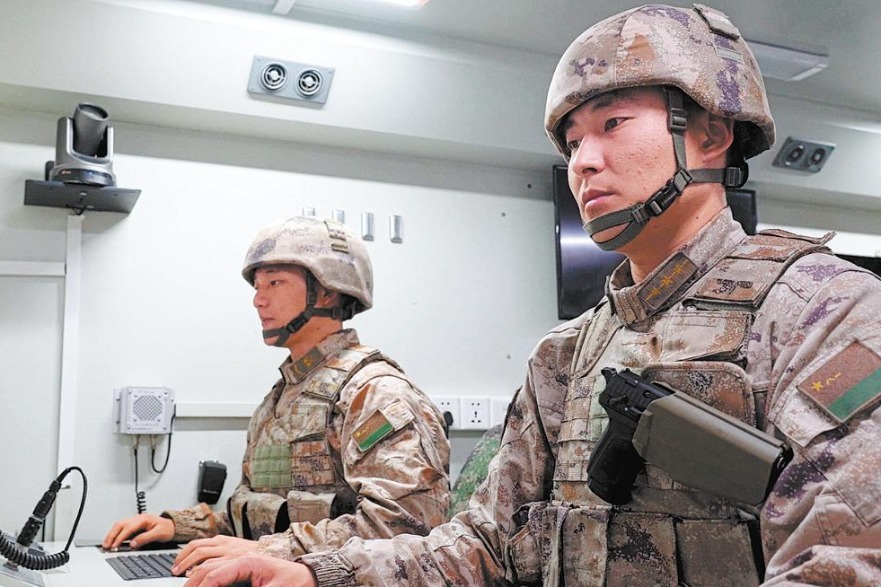Disabled keep hands on wheel

Do you think you could ride a bike 5,800 kilometers from the city of Xishuangbanna, in Southwest China's Yunnan province, on the border with Laos, to Beijing? Now imagine you could not use your legs but had to use the strength of your arms to travel that distance, across many mountain ranges.
Wang Feng and Pan Yifei, from China, with Domonic Corridan and Josh Dominick, from the United States, left Xishuangbanna in April and arrived in Beijing 106 days later. Except for Josh, they are paraplegics - after being injured, they could no longer use their lower bodies. They rode hand cycles - tricycles propelled entirely by hand-powered cranks.
Wang Feng, who is from Zaozhuang, Shandong province, developed acute myelitis when he was 15 years old, still in middle school, and has been paraplegic ever since. But that has not stopped him. He works as a baby masseuse and has proved he can accomplish things few fully able people dare.
| Josh Dominick teaches Guan Shilian how to ride a handcycle in Beijing. Pan Yifei and Lyu Xianglan (right) are in the wheelchairs in the background. Photos by Yan Dongjie / China Daily |
| Lyu Xianglan flashes a big smile during his first handcycle ride. |
"The trip from Xishuangbanna to Beijing was my longest ride and my biggest challenge ever. Finishing it gave me more confidence, as well as a better-built body. I won the 5,800 km, and won myself," he said. "For me, the biggest meaning is that I came to know that nothing could beat me down. This is a milestone in my life. It's encouraging and exciting to know that I can travel far, like normal people. I made it, and made my life."
Pan Yifei was injured in 2015 in a car crash in the mountains near the Great Wall in Beijing. He can feel nothing below chest level. But he has always been optimistic. When telling his story, he talks with hands waving and eyebrows flying, as if the incident was a normal part of his life.
On the third day after leaving Xishuangbanna, coming down a mountain in the rain, his trike turned over and he flipped five times. He was stopped from sailing off a cliff only because he hit an abandoned truck. His right arm had a deep gash and he had to be taken to a hospital. But Pan didn't quit the trip. He followed the group in a chase van all the way to Beijing. He says: "I hope more disabled people can come out of their rooms and overcome obstacles - not only physical but also in their hearts - and live a normal life."
Josh Dominick is an able-bodied American who has lived in China for 16 years. He became interested in helping people with disabilities after meeting his friend and fellow rider Domonic Corridan. Four years ago, he set up a group, Krankin Thru China, to introduce handcycles to disabled people.
The group doesn't just do epic adventures. It often meets in Beijing to allow local people with disabilities to people to learn about handcycling.
On a recent Sunday afternoon, near Olympic Forest Park, two women, Lyu Xianglan and Guan Shilian, had huge smiles as they took their first handcycle rides.
Guan Shilian, who had polio, says: "It's my first time experiencing this kind of bike. I never rode a bike before - not even ever walked like a normal person. It feels great when I can move in the direction that I want to go and make my own way."
Dominick says he is hoping to develop a variety of adaptive sports that can be enjoyed by all people with disabilities. For example, he and Pan are planning to go paragliding in late September in Luoyang, Henan province.
He says the goal is not really cycling.
"It's hard for disabled people to move around and exercise, but I want to help them with that. When people have disabilities they tend to lose confidence, feeling that they can do nothing. But when they ride a bike, they will feel better and gain back the confidence to do more. They can live a confident, happy and free life."
He recounts an episode when the group stopped at a waterfall in Guizhou province. The woman who attended the gate there did not want to let them in, despite their legal right to enter. She says: "Why are you out? Why don't you just stay home?"
"A big problem is that the general public does not encourage disabled people to take part in normal activities. It needs to be normal to see a person in a wheelchair doing ordinary things - buying groceries, earning a living, playing with their children. Handicapped people need to earn a living," he says.
Handcycling and other sports are a way for people with disabilities to gain self-confidence, but maybe also to show the rest of us how much can be accomplished.
Contact the writers at davidblair@chinadaily.com.cn and yandongjie@chinadaily.com.cn
| Wang Feng and Domonic Corridan en route from Xishuangbanna to Beijing. Provided to China Daily |
(China Daily European Weekly 09/15/2017 page8)
Today's Top News
- China holds central rural work conference
- President Xi to deliver New Year's message to ring in 2026
- Xi's diplomacy in 2025: Shedding light on a world at crossroads
- China to apply lower import tariff rates to unleash market potential
- China proves to be active and reliable mediator
- Three-party talks help to restore peace

































